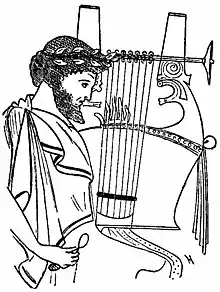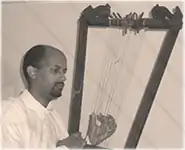Kollops
A kollops (Ancient Greek: κολλοψ or kollabos) is a tuning device for a string instrument (generally a lyre) which consists of a strip of leather wrapped around the instrument's crossbar, tightened by a wooden peg trapped in its wrap. The device is mentioned as early as the 7th century BC, used metaphorically in the Odyssey.[1] The material itself, usually the hard material at the back of the neck of an ox, was known as "kollops" and thus the term was also used for the tuning device.[2]

Modern usage

Though the kollops is largely obsolete, one living instrument still sometimes employing it is the Ethiopian begena lyre.[3]
Other uses of the term
The term kollops was also used in Ancient Greece as slang for an aged male prostitute, presumably by the same analogy to the hardened back neck leather of an ox.[4]
References
- John G Landels (31 January 2002). Music in Ancient Greece and Rome. Routledge. pp. 73–. ISBN 978-1-134-70486-6.
- Hortense Panum (1939). The Stringed Instruments of the Middle Ages: Their Evolution and Development : a Detailed and Comprehensive History, with Illustrations, of the Evolution of the Mediaeval Stringed Musical Instruments from Their First Appearance in the Records of the Earliest Civilisations, Through Their Gradual Development in the Greek, Roman and Christian Eras Down to More Recent Times. W. Reeves. p. 43.
- Sibyl Marcuse (1975). A survey of musical instruments. Harper & Row. p. 364. ISBN 978-0-06-012776-3.
- Allison Glazebrook; Madeleine M. Henry (6 January 2011). Greek Prostitutes in the Ancient Mediterranean, 800 BCE–200 CE. Univ of Wisconsin Press. pp. 248–. ISBN 978-0-299-23563-5.